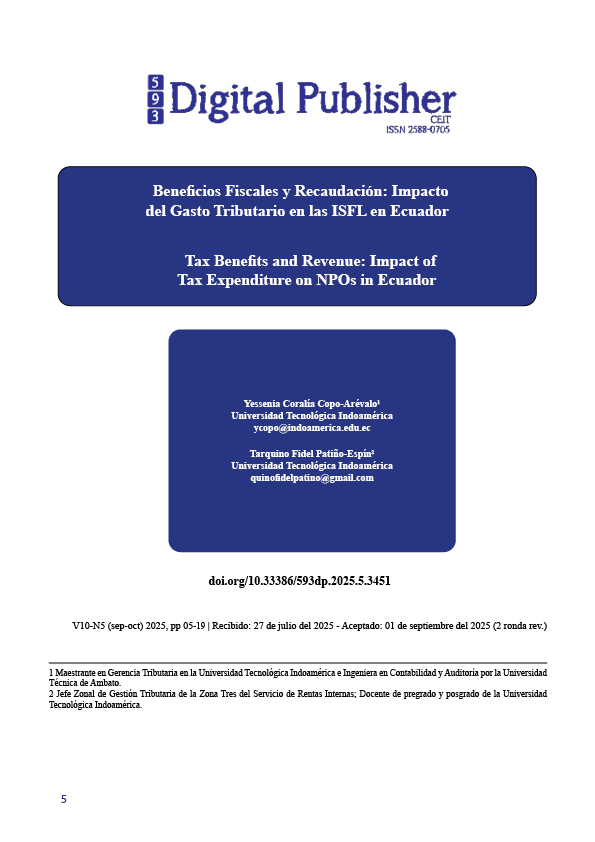Tax Benefits and Revenue: Impact of Tax Expenditure on NPOs in Ecuador
Main Article Content
Abstract
Tax expenditure, understood as the set of exemptions, deductions, and tax benefits granted by the State, is a key tool for analyzing fiscal policy. This study evaluates the impact of these exemptions on Ecuador's tax revenue, focusing on the benefits granted to Non-Profit Institutions (NPIs) during the period 2020–2022. The research analyzes how these deductions and exemptions have affected the taxable base of Income Tax and, consequently, the State’s fiscal revenue. The methodology was based on the analysis of reports from the Internal Revenue Service (SRI), allowing for the estimation of the impact of tax benefits on tax expenditure. In 2020, tax expenditure reached USD 3,873.40 million, of which 32.8% corresponded to Income Tax, with a significant share attributed to NPIs. In 2021, tax expenditure increased to USD 4,850.05 million, and in 2022, it rose to USD 5,151.80 million. The results show that, although tax exemptions for NPIs serve an important social purpose, they have a significant impact on state revenue. This highlights the need to review fiscal policy to ensure a balance between supporting these organizations and maintaining sustainable public income.
Downloads
Article Details

This work is licensed under a Creative Commons Attribution-NonCommercial-ShareAlike 4.0 International License.
1. Derechos de autor
Las obras que se publican en 593 Digital Publisher CEIT están sujetas a los siguientes términos:
1.1. 593 Digital Publisher CEIT, conserva los derechos patrimoniales (copyright) de las obras publicadas, favorece y permite la reutilización de las mismas bajo la licencia Licencia Creative Commons 4.0 de Reconocimiento-NoComercial-CompartirIgual 4.0, por lo cual se pueden copiar, usar, difundir, transmitir y exponer públicamente, siempre que:
1.1.a. Se cite la autoría y fuente original de su publicación (revista, editorial, URL).
1.1.b. No se usen para fines comerciales u onerosos.
1.1.c. Se mencione la existencia y especificaciones de esta licencia de uso.
References
Arias, F. (2012). El proyecto de investigación (Sexta ed.). México: Episteme C. A.
Bernal, C. A. (2010). Metodología de la Investigación, administración, ecomomía, humanidades y ciencias sociales (Tercera ed.). (O. Fernández Palma, Ed.) Bogotá: Pearson.
Caicedo, D. C. (2020). Impacto de la política fiscal en la desigualdad de género: el caso del IVA en Colombia. Revista de derecho fiscal(17), 185-210. doi:https://doi.org/10.18601/16926722.n17.06
Cardona, J. (2020). Beneficios tributarios otorgados por las entidades territoriales en el marco del principio de autonomía territorial. Revista de derecho fiscal(17), 247-310. doi:https://doi.org/10.18601/16926722.n17.09
Centro Interamericano de Administraciones Tributarias. (3 de octubre de 2017). Sistemas Tributarios y Reformas Tributarias. Algunas Ideas del Tema. Recuperado el 22 de febrero de 2025, de https://www.ciat.org/sistemas-tributarios-y-reformas-tributarias-algunas-ideas-del-tema-parte-1/
Charles, V. (19 de septiembre de 2023). Los países pueden aprovechar su potencial tributario para financiar los objetivos de desarrollo. Obtenido de https://www.imf.org/es/Blogs/Articles/2023/09/19/countries-can-tap-tax-potential-to-finance-development-goals
Hernández, R., Fernández, C., & Baptista, M. d. (2010). Metodología de la investigación (quinta ed.). México: McGRAW-HILL / INTERAMERICANA EDITORES, S.A.
Herrera, L., Medina, A., & Naranjo, G. (2004). Tutoría de la investigación Científica . Ambato: Gráficas Corona.
Hidalgo, J. (2023). Impuestos en el Ecuador: sistema tributario y opciones para elevar los ingresos permanentes del fisco. PNUD América Latina y el Caribe. Obtenido de https://www.undp.org/sites/g/files/zskgke326/files/2023-12/pds-number45_tributario_ecuador_es.pdf
Jorratt, M. (2010). ANÁLISIS DEL GASTO TRIBUTARIO Y PROPUESTAS DE INCENTIVOS FISCALES A LA INVERSIÓN Y AL EMPLEO EN ECUADOR. Quito: Servisio de Rentas Internas. Obtenido de https://repositorio.flacsoandes.edu.ec/bitstream/10469/3870/1/REXTN-F04-01-Jorratt.pdf
Mejía, O., Pino, R., & Parrales, C. (2019). Políticas tributarias y la evasión fiscal en la República del Ecuador. Aproximación a un modelo teórico. Revista Venezolana de Gerencia, 24(88), 1147-1165. Obtenido de https://www.redalyc.org/journal/290/29062051010/html/
Mieles, J. (2024). Evaluación del sistema fiscal ecuatoriano en la equidad y variación compensada a través del Bono de Desarrollo Humano para el año 2023. Quito: Facultad Latinoamericana de Ciencias Sociales, FLACSO Ecuador. Recuperado el 2025 de 27 de marzo, de https://repositorio.flacsoandes.edu.ec/bitstream/10469/20752/2/TFLACSO-2024JDML.pdf
OECD. (2020). Gastos tributarios en América Latina y el Caribe. Obtenido de https://www.oecd-ilibrary.org/sites/87af9961-es/index.html?itemId=/content/component/87af9961-es
OECD. (2021). Tax Expenditures in Latin America: An Analysis of Efficiency and Equity.
Podestá, A. (2020). Gasto público para impulsar el desarrollo económico e inclusivo y lograr los Objetivos de Desarrollo Sostenible. Santiago - Chile: Publicación de las Naciones Unidas. Obtenido de https://www.cepal.org/sites/default/files/publication/files/46276/S2000670_es.pdf
RINDHCA. (23 de julio de 2021). El rol de las instituciones nacionales de derechos humanos de América Latina en la implementación de la Agenda 2030 para el Desarrollo Sostenible. Recuperado el 25 de enero de 2025, de https://www.rindhca.org/actualidad/actualidad-rindhca/el-rol-de-las-instituciones-nacionales-de-derechos-humanos-de-america-latina-en-la-implementacion-de-la-agenda-2030-para-el-desarrollo-sostenible?highlight=WyJlbCIsInJvbCIsImRlIiwibGFzIiwiaW5zdGl0dWNpb
Servicio de Rentas Internas. (2022). Manual de Gasto Tributario. Quito: SRI.
Siguenza, S., Sandoval, K., Vizcaíno, A., Giron, E., Erazo, S., & Jimbo, L. (2020). La política fiscal y su incidencia en la cultura tributaria del Ecuador. Espacios, 41(47), 161-175. doi:10.48082/espacios-a20v41n47p12
Tanzi, V. (2011). Government versus Markets: The Changing Economic Role of the State. Cambridge University Press. doi:https://doi.org/10.1017/CBO9780511973154
Velasco, C., & Castañeda, C. (2017). Fortalecimiento del intercambio internacional de información para combatir el fraude fiscal del impuesto a la renta: caso de estudio comparativo entre Ecuador y Chile. Foro, Revista de Derecho(28), 95-111. Recuperado el 28 de marzo de 2025, de https://www.redalyc.org/pdf/900/90075910005.pdf



